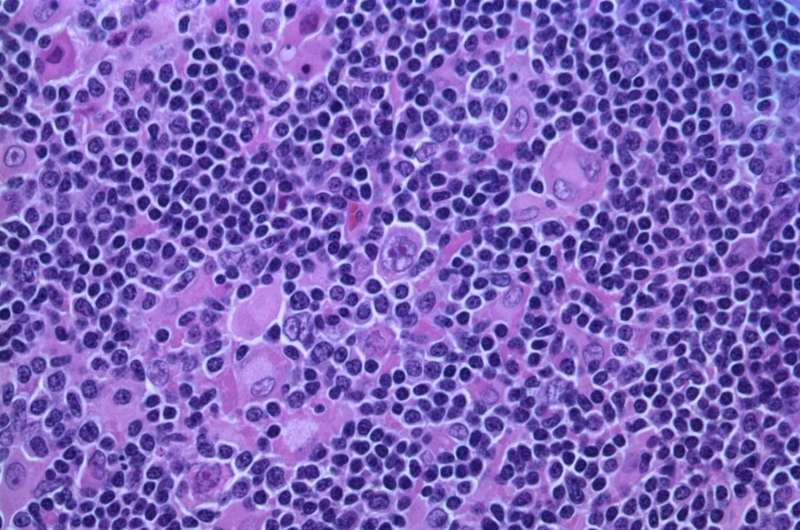Gene-modified, virus-specific T cell therapy shows promise in treating lymphoma, with little toxicity

In a first-of-its-kind clinical study, Baylor College of Medicine evaluated the safety, survival and anti-tumor activity of tumor-specific T cells rendered resistant to transforming growth factor β (TGFβ), in patients with Epstein Barr Virus (EBV) positive lymphoma. The results appear in the Journal of Clinical Oncology.
T cell therapies have demonstrated encouraging results and benefits in patients with chemotherapy resistant lymphoma, but despite these advances, a large number of patients still respond poorly. A major advantage of T cell therapy is that it is highly targeted to tumor cells, so it does not cause bystander damage. Patients can have successful responses with virtually no toxicity, unlike their experience with chemotherapy and radiation.
Like most tumors, lymphomas are immunosuppressive and contain multiple cell types that secrete inhibitory molecules, including TGFβ. TGFβ inhibits the expansion and function of tumor-directed T cells, limiting their ability to eliminate tumors.
"We modified our EBV-specific T cells with a dominant-negative TGFβ receptor in which the intracellular signaling domain had been deleted. This mutant receptor can bind TGFβ but does not transmit an inhibitory signal and also blocks the inhibitory signaling of TGFβ through its normal receptor," said Dr. Cliona Rooney, professor of pediatrics, division of hematology and oncology and the Center for Cell and Gene Therapy at Baylor College of Medicine, Texas Children's Hospital and Houston Methodist Hospital.
The research team began to investigate this strategy in 2002. Early studies showed that T cells expressing the dominant-negative TGFβ receptor could grow in the presence of TGFβ, while unmodified T cells failed to grow and died within two weeks. Later, they evaluated the strategy in animal models for safety and efficacy, which led to the design of the clinical trial.
"In an earlier clinical study of unmodified EBV-specific T cells, more than 50 percent of patients experienced complete remission, and tumor responses were observed in over 70 percent," said Rooney, who also is senior author on the current study. "In the new study, patients who did not experience complete responses to unmodified EBVSTs had complete responses to the same T cells modified with the dominant negative TGFb receptor."
"These results come 18 years after this revolutionary approach was first conceptualized. While the study is small, its findings are encouraging for our patients' families and for the cancer field," said Dr. Catherine Bollard, now director of the Children's Research Institute's Center for Cancer & Immunology Research and previously at Baylor when the study was conducted, and first author of the study.
This research is a great illustration of bench-to-bedside work and the power of virus-specific T cells to produce significant patient response with little toxicity, the researchers said.
"After two bone marrow transplants and nearly two years of chemotherapy combined with weeks of radiation, my Hodgkin's Lymphoma was still not in remission. The doctor who oversaw my transplants knew of the T cell trial at the Center for Cell and Gene Therapy and referred me for treatment. After speaking with Dr. Bollard and Vicky Torrano, it sounded like a worthwhile try since conventional treatment methods were not working," said Nick Asoian, a participant in the trial who is based in Denver. "Over the course of about two years I had 12 infusions, and since my last infusion I have had many PET scans that are now showing no evidence of Hodgkin's disease."
More information: Catherine M. Bollard et al. Sustained Complete Responses in Patients With Lymphoma Receiving Autologous Cytotoxic T Lymphocytes Targeting Epstein-Barr Virus Latent Membrane Proteins, Journal of Clinical Oncology (2013). DOI: 10.1200/JCO.2013.51.5304













